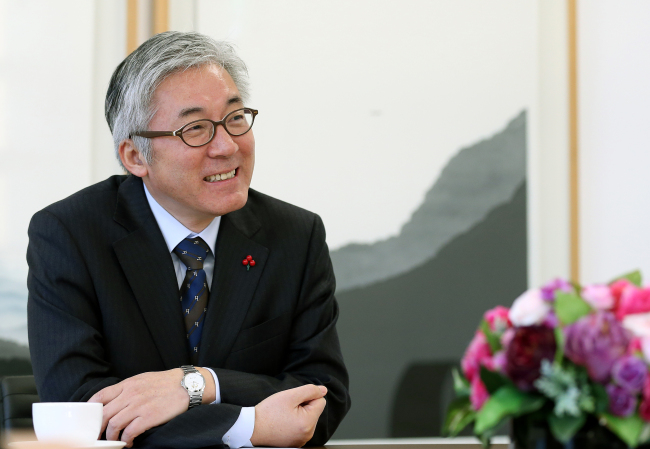[Gwangju Universiade] Gwangju Universiade confirms sports-advanced Korea: Minister
By 노지웅Published : July 15, 2015 - 03:43
With the conclusion of the 28th world university games, the Republic of Korea (ROK) became the seventh nation to host a Summer Universiade two times or more since the first edition in Torino, Italy, in 1959. The 2003 edition was hosted by Daegu City.
Congratulating the organizers of the Gwangju Universiade, Korea’s Minister of Culture, Sports and Tourism Kim Jong-deok said in a recent interview with the Universiade Daily that it will set a good example for international sports events, as it was successfully hosted by keeping costs low.

He noted that the central and city governments sought to minimize the financial burden by hosting it in a practical and environment-friendly way.
Out of the 37 stadiums and gymnasiums, only four were newly built. The total budget of 617 billion won ($546 million), including expenditure for the opening and closing ceremonies, stayed at less than 40 percent of that of the 2014 Incheon Asian Games, according to the Gwangju Universiade Organizing Committee (GUOC).
“We eventually attained the goal of low-cost and high-efficiency, which could be a future model. The success can be largely attributed to the active cooperation and voluntary participation of Gwangju citizens,” Kim said expressing his gratitude to about 10,000 volunteers and some 50,000 supporters who cheered athletes at competition venues.
“Citizens, in particular, actively cooperated with traffic control for the ‘alternate day no-driving system’ (throughout the 12-day period of the games), which contributed to the success.”
The ministry reviewed several shortcomings at the Incheon Asian Games last year and revised the organizing system.
Staffers focused more on communication with citizens by holding a daily media briefing from the first day of the Universiade to the closing day.
Kim said an in-depth analysis of the Gwangju Universiade would pave the way for the government to prepare well for the 2018 PyeongChang Winter Olympics. “We plan to make the PyeongChang Olympics a global festival involving all (South Korean) citizens.”
Despite the drastic scaling back of the budget, the government prioritized the safety of athletes and spectators.
In addition to its security arrangements against possible terror attacks, it made full-fledged efforts to shield the city from the Middle East respiratory syndrome (MERS) outbreak -- which dealt a blow to the nation in May and June -- in close collaboration with the quarantine authorities in Gwangju and South Jeolla Province.
The organizing committee conducted simulation exercises to deal with the virus effectively, such as quarantine operations, physical examinations, patient isolation and epidemiologic investigations.
“I believe the Universiade will provide the host city with the opportunity to upgrade the region’s culture, arts and tourism industries.”
The nation has reaffirmed its status as an advanced country in sports by successfully hosting the Universiade, which may be comparable to the Olympics, he said.
Korea’s qualification as a host of major international sports events has been acknowledged by the global community. The country along with Japan also hosted the 2002 FIFA World Cup, while many cities and regions -- Seoul, Muju, Jeonju, Busan, Daegu and Incheon -- hosted diverse events like the Olympics, Asian Games, Universiade and World Athletics Championships.
With the Winter Olympics scheduled for PyeongChang in Gangwon Province, all Korean provinces except for Chungcheong and Jeju have hosted an international sports competition.
The Gwangju Universiade has drawn attention with four non-sport visions featured by the organizing committee for athletes and spectators.
They were expressed in the acronym “EPIC” which stands for Eco, Peace, IT and Culture, he noted.
Guided by the vision of Ecoversiade, the city tried to preserve the environment by using as many existing sports facilities as possible. The Peaceversiade showed that Gwangju is committed to democracy, human rights and peace.
ITversiade called for the city to take advantage of the nation’s advanced IT infrastructure to run the games efficiently. Cultureversiade came natural as the city has been regarded as the hometown of art and culture in Korea from old times.
From July 3-14, the city ran familiarization tours for athletes to see traditional Korean architecture or travel around scenic spots in the southern part of the country by train.
The city government operated tours of South Jeolla Province every day throughout the Universiade and also ran thematic walking tours and urban bicycle tours of the city.
“Gwangju provided more than 130 programs with culture, arts and tourism combined (for the 12 days),” said the minister.
Born in Cheongju, North Chungcheong Province, in 1957, Kim had served as president of the Korean Society of Design Science and dean of the graduate school of advertising and public relations at Hongik University in Seoul. He took office as the minister in August 2014.
By Kim Yon-se (kys@heraldcorp.com)



![[AtoZ into Korean mind] Humor in Korea: Navigating the line between what's funny and not](http://res.heraldm.com/phpwas/restmb_idxmake.php?idx=644&simg=/content/image/2024/04/22/20240422050642_0.jpg&u=)


![[Herald Interview] Why Toss invited hackers to penetrate its system](http://res.heraldm.com/phpwas/restmb_idxmake.php?idx=644&simg=/content/image/2024/04/22/20240422050569_0.jpg&u=20240422150649)
![[Exclusive] Korean military set to ban iPhones over 'security' concerns](http://res.heraldm.com/phpwas/restmb_idxmake.php?idx=644&simg=/content/image/2024/04/23/20240423050599_0.jpg&u=20240423183955)
![[Graphic News] 77% of young Koreans still financially dependent](http://res.heraldm.com/phpwas/restmb_idxmake.php?idx=644&simg=/content/image/2024/04/22/20240422050762_0.gif&u=)






![[Exclusive] Korean military to ban iPhones over security issues](http://res.heraldm.com/phpwas/restmb_idxmake.php?idx=652&simg=/content/image/2024/04/23/20240423050599_0.jpg&u=20240423183955)



![[Today’s K-pop] Ateez confirms US tour details](http://res.heraldm.com/phpwas/restmb_idxmake.php?idx=642&simg=/content/image/2024/04/23/20240423050700_0.jpg&u=)